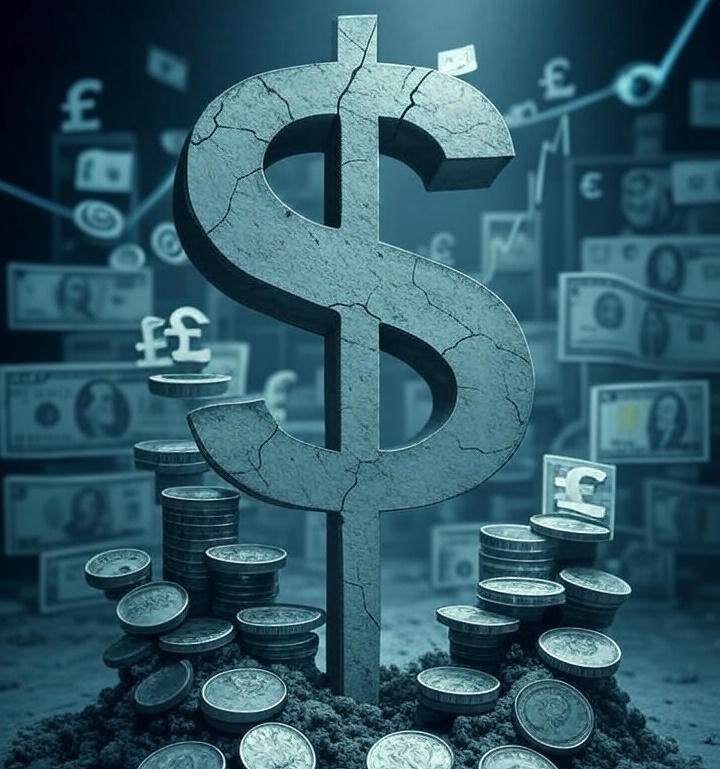For many years the U.S. dollar has been the most important currency in the world. It is used in global trade held by central banks as reserves, and trusted by investors. But today the dollar’s power is being questioned. With changing global politics new economic powers and shifts in investor confidence people are wondering: Is the U.S. dollar still as strong as it used to be?

Why the U.S. Dollar Has Been the Global Leader
The U.S. dollar became the global reserve currency after World War II. This means countries around the world started holding large amounts of U.S. dollars in their central banks. There were several reasons for this:
- The U.S. had the largest and strongest economy.
- Its financial markets were deep and liquid (easy to invest in).
- The U.S. government was seen as stable and trustworthy.
- Many global commodities like oil and gold were priced in dollars.
Because of these factors the dollar became the most used currency for international trade and investment.
What’s Changing Now?
In recent years several changes have made economists and investors question whether the dollar can keep its top position. Two major trends are causing concern:
1. Unstable U.S. Economic and Trade Policies
Countries and investors rely on the U.S. to have predictable and stable policies. But in recent years U.S. trade and foreign policies have become more unpredictable. For example:
- Trade wars with countries like China.
- High levels of government debt and repeated battles over the U.S. debt ceiling.
- Sanctions on countries that challenge U.S. interests.
These actions make other countries nervous. If the U.S. uses its currency as a weapon (for example blocking countries from using the dollar) they will look for alternative options.
2. Rise of Other Currencies
Countries like China and those in the European Union are pushing to increase the use of their own currencies globally.
- China’s renminbi (yuan) is now being used more in trade deals especially with countries in Asia, Africa and the Middle East.
- The euro is already the second most-used reserve currency.
- Some countries are forming regional trade blocs that use local currencies instead of the dollar.
What Are Central Banks Doing?
Central banks around the world are diversifying their currency reserves. Instead of holding only U.S. dollars they are adding more euros, renminbi and even gold.
This trend is slow but important. The International Monetary Fund (IMF) has reported a gradual decline in the dollar’s share of global foreign exchange reserves over the last decade.
How Does This Affect Financial Stability?
The global financial system depends on trust. When investors and countries start losing confidence in the U.S. economy and its currency financial stability can be at risk.
Recently officials from the European Central Bank (ECB) raised concerns that U.S. policies are damaging investor confidence. If investors believe that the U.S. is not managing its economy responsibly they may pull their money out of U.S. assets.
This can lead to:
- Market volatility (large swings in currency and stock prices)
- Higher interest rates as the U.S. tries to attract investment
- Slower global growth if the dollar becomes less stable
Can the Dollar Be Replaced?
Even with the rise of other currencies the U.S. dollar is still very strong. Around 60% of global reserves are still held in dollars. It is still the most widely used currency in global trade.
But that does not mean it will stay that way forever.
To keep the dollar strong the U.S. must:
- Keep its economy stable
- Maintain clear and fair trade policies
- Avoid using the dollar as a political tool
- Work with other countries to build global financial trust
What About Digital Currencies?
Another important development is the rise of digital currencies. Central banks are developing their own digital versions of money called CBDCs (Central Bank Digital Currencies).
- China has already launched a digital yuan in pilot programs.
- The European Union is working on a digital euro.
- The U.S. is studying the idea of a digital dollar but it’s not ready yet.
These digital currencies could change how people trade and invest globally. If they become popular they might reduce the world’s reliance on the U.S. dollar.
Final Thoughts
The U.S. dollar is still the king of global finance but it faces serious challenges. Other countries are pushing to reduce their dependence on the dollar and investors are watching U.S. policies closely.
To protect global currency stability it is important that the U.S. continues to act responsibly cooperates with other countries and keeps the trust of global markets.
The financial world is changing and the future of the dollar depends on smart choices made today.
